Feminéma’s La Jefita Awards, Part I
17 February 2013

This bronze Greek statue of a female Spartan athlete, ca. 500 BCE, serves as this year’s La Jefita award! (Winners must contact me directly to receive these excellent prizes.)
Only one more week before Oscar night, but who cares about that charade when there are the La Jefitas to think about? For the second year now I’ve compiled my list of the best 2012 films by and about women to celebrate those female bosses. It’s just one way I seek to subvert a male-dominated and sexist film industry. Because who cares about that Hollywood red carpet when you can enjoy an anonymous, verbose film blogger’s Best Of list?
Oh yeah, baby!
Unlike the flagrantly biased Oscars, the La Jefitas are selected with scientific precision; and although each year we have a select number of categories (Most Feminist Film; Best Female-Directed Film; Best Fight Scene in Which a Woman Kicks a Man’s Ass) we also add or tweak other categories to suit that year’s selections.
Shall we? Let’s start with a big one:
Best Actress:
Anna Paquin in Kenneth Lonergan’s Margaret. No matter how ambivalent you may feel about Paquin’s earning paychecks with fodder like True Blood (the later seasons, anyway) and the X-Men franchise, you can’t deny the force-of-nature bravura she displays in this extraordinary film. Replacing the saccharine Southern accent she put on in those other productions, she appears here with a kind of nervous mania that suits the particular cocktail of high school, trauma, selfishness, and guilt cooked up by this girl. When I wrote about it last spring, I called Paquin’s character an “asshole” — it’s hard, even now, for me to back away from that harsh term, for she has truly channeled the kind of chatterbox/ smartypants self-absorption and avoidance so crystalline in privileged teenaged girls. She captures it perfectly, and her particular vein of assholery is crucial to a film that wants us to think about the wake we leave behind us as we stride through the world.
Paquin won Best Actress, yet I have so many honorary mentions. I’ll narrow it down to two: Rachel Weisz in The Deep Blue Sea and Nadezhda Markina in Elena — two eloquent drawing room dramas that rely on perfectly-drawn portrayals by their female leads.
Female-Oriented Scene I Never Expected to See Onscreen (extra points for its political riskiness):
The abortion scene in Prometheus. Seriously? The film displayed such a strangely negative view of parenthood overall — indeed, I wondered in my long conversation with film blogger JustMeMike whether the film’s major theme was patricide — that in retrospect one was left shaking one’s head at all of Ridley Scott’s madness. And still, I return to the abortion scene. Wow — in this day and age, with abortion politics as insane as they are — did we actually witness an abortion in a major Hollywood release?
Yes, I know she was trying to abort an evil monster/human parasite/amalgam; but I’ll bet there are 34 senators in the U.S. Senate who would argue it was God’s plan that she bring that evil monster baby to term.
Best Fight Scene in Which a Woman Kicks a Man’s Ass:
Gina Carano has no competition this year after her performance in Steven Soderbergh’s Haywire. I know, I can’t remember the plot either; nor can I remember how it ended. And no, I’m not going to talk about the dialogue, or Carano’s acting ability.
Rather, the entire film was a paean to Carano’s superiority in ass-whupping. It was a thing of beauty — starting with her takedown of Channing Tatum in the diner and reaching its crowning glory with teaching Michael Fassbender a lesson in the hotel room. Be still my heart. Who needs plot or dialogue when you’ve got a human tornado?
Most Depressingly Anti-Feminist Trend of the Year:
 Where did all the parts for Black women go? The tiny dynamo Quvenzhané Wallis has ended up with a well-deserved nomination for Best Actress this year — for her work in Beasts of the Southern Wild, filmed when she was six years old — but people, no 6-yr-old can carry the experiences of Black women on her tiny little shoulders.
Where did all the parts for Black women go? The tiny dynamo Quvenzhané Wallis has ended up with a well-deserved nomination for Best Actress this year — for her work in Beasts of the Southern Wild, filmed when she was six years old — but people, no 6-yr-old can carry the experiences of Black women on her tiny little shoulders.
Sure, we all complained last year about The Help — really, Hollywood? you’re still giving Black women roles as maids? — but let’s not forget some of the other films last year, most notably (to me) Dee Rees’ Pariah. And although I’m not surprised to find an actress of Viola Davis’ age struggling to get good work onscreen, I want to register how utterly depressing it is to find a Black woman of her talent and stature not getting leading roles in great films.
One can argue that high-quality TV is making up for the dearth of great parts for Black women onscreen. Just think about Kerry Washington in Scandal, for example. But for the sake of the La Jefitas I’ve limited myself to film — and I want more non-white actors, dammit.
Most Feminist Trend in Film in 2012:
2012 was the Year of Fierce Girls. It doesn’t take much to call to mind the most obvious films, starting very much with Wallis in Beasts of the Southern Wild. To list a few:
Now, I will also say that with all these good parts going to awesome girls (some of them animated, however), I didn’t see as many terrific parts going to mature/ middle-aged women; but still, considering how deeply male-dominated children’s filmmaking is, this is a very positive trend indeed.
Best Breakthrough Performance by an Actress Known for Very Different Roles:
Jennifer Lawrence in Silver Linings Playbook. I have a big ol’ crush on Lawrence from her serious roles, but I’ll be the first to admit that she found herself getting the same part over & over — that fiercely independent teen girl who struggles against the Great Forces that make life so difficult (Winter’s Bone, X-Men: First Class, The Hunger Games). Comedy wouldn’t have struck me as Lawrence’s forte.
So count me impressed. Surrounded by excellent actors inclined toward broad humor, she does something crucial to make this film work: she balances her humor with a true gravitas that keeps this dizzy screwball comedy grounded. She’s funny, but it’s her seriousness and laser focus that stay with you and remind you what a good film this is. And part of the way she does it is through her sheer physical presence — she is so sexy while also being formidable. This is no tiny slip of a girl who’ll fade away from Bradley Cooper’s character, the way his wife left him emotionally. You get the feeling their relationship will remain a rocky road, but their attraction and shared neuroses will keep things interesting for a long, long time to come.
Best of all, this change-up will hopefully give Lawrence lots of scripts for the near future, giving her the chance to develop more chops.
Most Feminist Film:
Nadine Labaki’s Where Do We Go Now, the sneaky, funny, sexy Lebanese film about a tiny remote village split down the middle between Christians and Muslims. A wicked, perfect retelling of Aristophanes’ Lysistrata.
Like Lysistrata, Where Do We Go Now? addresses the serious problem of war via a deep unseriousness; the Muslim and Christian women in this village seek out increasingly goofy means of distracting their men from hating one another. Add to this the fact that beautiful widow Amale (Labaki) and the handsome handyman Rabih (Julian Farhat) can barely stay away from one another, despite the fact that they hold separate faiths.
That tonal unseriousness leaves you unprepared for the terrific quality of the women’s final solution — which reminds us that the topic ultimately addressed by the film (violence in the Middle East more broadly) is so important, and so rarely examined from women’s perspectives. A terrific film that makes you wonder why no one else has mined the genius of Aristophanes until now.
Honorary mentions: Turn Me On, Dammit! and Brave.
That’s all for today — but stay tuned for tomorrow’s La Jefitas Part II post, in which I announce this year’s Film of the Year, Best Role for a Veteran Actress Who Is Not Helen Mirren or Meryl Streep, Sexiest Scene in Which A Woman Eats Food, and Best Female-Directed Film. Yes, these are all separate categories. Because reading Feminéma is like everything you’re missing at the Oscars, friends! it’s like Christmas in February!
And in the meantime, please let me know what I’ve forgotten and what you want to argue about — I do love the give and take. Winners: contact me directly at didion [at] ymail [dot] com to receive your prizes!
“The Girl Who Played with Fire” (2009)
7 August 2010
As during most summers, I haven’t found much more than a few films that pass The Bechdel Test — that is, a film 1) with two or more women in it, 2) who talk to each other, and 3) about something other than a man. In fact, even some of the best ones pass only by a slim margin, like “Winter’s Bone” … and that was pretty far-flung from summer movie fare.
But then there’s “The Girl Who Played with Fire,” the second installment of the Swedish film trilogy version of Steig Larsson’s three-volume Millennium series that has sold cadrillions of copies worldwide. Look, don’t get the wrong idea: this film is inferior to the first one, “The Girl with the Dragon Tattoo,” and it gives only short shrift to some of my favorite parts of the novel, like Lisbeth’s relationship with Miriam Wu. But c’mon, it’s a hot summer and our critical defenses are down, as we’re tacky with sunscreen and eager for a couple of cool hours inside a blessedly dark theater. Saintlike, the brilliant character of Lisbeth Salander is fighting our battles for us, veering back and forth between her unparalleled tech savvy in hacking computers and kicking the asses of bad guys ten times her size.

For me, the character of Lisbeth addresses head-on a lot of the problems I have with our otherwise limited range of female action heroes (and here I’m also thinking about recent comments by Snarky’s Machine and Anita Sarkeesian of Feminist Frequency). She’s gay, she’s an intensely focused computer-smart researcher, she’s come through a horrific childhood of abuse, she’s barely 5 feet tall, and she doesn’t dress in clothes that send anyone mixed messages. Her fury against men who hate women isn’t played for comic effect with a series of great one-liners; in fact, she’s very often silent, like the laconic heroes of old Westerns. When her father abused her mother one too many times when Lisbeth was 12, she set him on fire. She doesn’t try to get anyone to like her — and if there’s any message we can glean from this film, it’s that people like and trust her anyway. Thinking about these things out loud is like Alison Bechdel articulating her Bechdel Test for films: once you think about it and realize how few characters do much more than confirm men’s ideas about what makes a sexy or compelling woman, you want to become Lisbeth yourself.

Like I say, I’m not going to make any claims about the high quality of this film, which in some ways is a placeholder for the final film, “The Girl Who Kicked the Hornet’s Nest” (2009), which still has no release date set for the U.S. — a shame, as next year we’ll be subjected to David Fincher’s American remake of the first film, starring Daniel Craig as the muckraking journalist (depressed sigh). The novels become increasingly focused on Lisbeth as they go along, and this film mirrored that tendency, delightfully. As we left the theater last night, we burbled about all the parts of the novel that can’t help but make that final film better than this one. As we wait for it, let’s all channel a little Lisbeth the next time that male colleague waits for you to laugh at his joke, one of those offensive Jim Beam commercials pops up on TV, or you feel a racial tension headache coming on from the latest right-wing nutbag ideas about repealing the 14th Amendment to the Constitution. Ladies, turn on your computers and brush up on your kickboxing: your skills may be needed soon.

Queer eyes and smart girls
11 April 2010
…in which I think about smart objects of desire and girls’ willingness to identify with both boys and girls.
I used to have a crush on Jon Stewart, but for a long time now it’s been Rachel Maddow. Exemplary of her crush-worthiness is when she interviewed J. D. Hayworth — the conservative Tea Party opponent of John McCain in the upcoming AZ Republican primary — who’s been making a lot of political hay reviving the gay marriage “problem.” The homophobic Hayworth claims that the Massachusetts Supreme Court defines marriage as “the establishment of intimacy,” and argues that such a definition leaves open the possibility that men will marry horses:
Maddow: “Where in Massachusetts law or in the Supreme Court ruling does it say, ‘the establishment of intimacy?’ I read, spent the whole afternoon sort of looking for that, and couldn’t find it anywhere.”
Haworth: “The high court in Massachusetts defined marriage in a rather amorphous fashion, simply as, quote, ‘the establishment of intimacy.’ Now, I think we all agree there’s much more to marriage than that.”
Maddow: “Sir, I’m sorry, it didn’t.” (Goes through every example of the use of “intimacy” in the decision and MA state law and shows it doesn’t appear.)
Hayworth: “Well, that’s fine. You and I can have a disagreement about that.”
Maddow: “Well, either it’s true or it isn’t. It’s empirical.” (Hayworth stumbles and fumbles on his way out of the interview.)
Me, fawning: “Rachel, will you marry me?”
It’s not just that Maddow speaks truth to power, like Stewart did on “Crossfire” back in 2004; it’s the brevity and lucidity of her comments like “it’s empirical” that make me go mad for Maddow. (Plus, obviously, she takes no prisoners, likes cocktails, speaks frequently of her partner Susan, and is a geek). But then I have a long history of wanting to be with smart girls, wanting to be them, wanting to do them, wanting to watch them. It’s baffling to me that, according to received wisdom, men only want to watch men. (Cheers to all those actual men out there who feel the same way I do about smart women.)
Smart girls are hot. Lisbeth Salander (Noomi Rapace) in “Girl with the Dragon Tattoo”; Kima Greggs (Sonja Sohn) from “The Wire”; Jane Tennison (Helen Mirren) from the “Prime Suspect” series; Sybylla Melvyn (Judy Davis) in “My Brilliant Career.” They’re hot because they don’t need to please men; indeed, much of the time they’re smart enough to do without them altogether.
One of the problems I keep circling as I write this blog is that according to popular culture, men are the privileged readers/viewers: they avoid women’s films and “chick lit.” Women will read/watch everything, but men only read/watch stuff by/about men. Because of this, it’s no surprise we have Harry Potter rather than Hermione Granger as the main protagonist. I remember reading Lloyd Alexander’s The Book of Three aloud to a ten-year-old girl who unabashedly identified with both male and female characters. When Scott O’Dell wrote Island of the Blue Dolphins in the 60s, he had to fight to keep the protagonist a girl. (Never mind that it was based on a true story, or that he won the Newbery Medal and other prizes — the important point, from a publisher’s perspective, is he didn’t sell as many copies as he might have otherwise.)
In a different mood, this might be the opening for me to denounce the sidelining of women authors and women characters — and the concomitant emphasis on all those male buddy films, the fact that children’s shows have three male characters to every one female character (according to the new Geena Davis Institute on Gender in Media), “The Frat Pack,” and all things Judd Apatow, in which men bull-headedly just don’t get women, and engage in a lot of fag and fart jokes.
I’ll keep denouncing those things, to be sure. But for the moment I’m struck by something else: the fact that, in essence, female reader/viewers learn what you might call a queer view of self. I think women learn to see the world with queer eyes, a perspective that holds the possibility of allowing women simply to enjoy looking at women in a non-male-oriented way altogether. The problem comes when women simply channel this toward making themselves attractive to men — but I think that if we can teach them to emulate the smart girls rather than the Playboy bunnies, we might see this queer view as really pretty subversive.
Now, Rachel: please cover women’s issues more.
“Girl with the Dragon Tattoo” (2009)
9 April 2010
This film, like Steig Larsson’s book, serves up satisfying feminist retribution to the men who hate women. And I’m probably that viewer the filmmakers dreaded: someone who walked into the theater with a lot of trepidation, way too familiar with Larsson’s Millennium trilogy of books and worried that the film would be too literal or not faithful enough (aka the Harry Potter dilemma). Count me as officially relieved, then, that they did a good job of selecting the right parts to put into this 2½-hour film, leaving out only (and sadly) most of the twisty-turny corporate corruption narrative. They found the right guy to play the muckraking journalist, Mikael Blomkvist (Michael Nyqvist): homely and decidedly middle-aged, his face a bit sunken by gravity and acne scarring. Most of all I fretted that they would have played the character Lisbeth Salander as a gorgeous sexpot hiding behind her goth makeup and piercings. Noomi Rapace is the perfect movie rendition of Salander — not so skinny and withdrawn as in the book (some of whose characters even wonder whether she’s autistic or brain damaged). Rapace prompts the viewer’s curiosity and sympathy while still being unknowable and filled with an alarming rage. Her version of Salander mediates between her still surface and her occasional bouts of violence by using her black eyes carefully in all her scenes — when they dart a bit, you know she’s accessing her magnificent intellect like the computers she hacks so effortlessly. Still waters run deep, she shows us.

The Swedish title of both film and book is Men Who Hate Women (Män som hatar kvinnor, which makes me want to know exactly why that title got lost in translation to English). Therefore, it’s custom-made to appeal to me, and not just because the author’s feminist rage at sexual and psychological abuse of women is so satisfyingly on display: its other main character is lefty, heroic journalist Blomkvist (and how much do I love a story of heroic journalists, from “His Girl Friday” to “All the President’s Men” and “Good Night and Good Luck”?). Hired to solve the 40-year-old disappearance and likely murder of the young neice of a Swedish corporate magnate, Blomkvist shares the story equally with Salander, a young woman whose formidable outward appearance serves as armor against the horrific life she’s had, of which we only get glimpses. It’s because of her hacking skills that she gets involved in the case, and she eventually moves up to the remote part of the Swedish coast where Blomkvist is working. They begin to realize that in addition to being related to a miserably mean family of former Nazi sympathizers, the missing girl had stumbled onto a string of serial murder/ tortures of at least six women shortly before she disappeared.

If the journalist in the film channels the male author’s well-meaning feminism, Salander has long personal experience of abuse and rape. One of the things I liked so much about the books is that Larsson didn’t try to get the reader to “understand” or effuse emotion at Salander, the rape victim; rather, he wants to do something about it, perhaps partly via the books. In the process he offers women like Salander an enormous respect that the paternalistic shits who write for “Law & Order: SVU” should watch carefully. The film doesn’t back away from the brutal scene in which she’s abused and raped by the new lawyer appointed to serve as her guardian, a man in a uniquely powerful position to inflict this abuse. Neither does it back away from an equally brutal scene in which she enacts retribution against him.
It’s worth pausing to think for a moment about rape onscreen, which I truly hate. From “Boys Don’t Cry” to “Monster,” I think these scenes in general are far too disturbing to advance the story, and become sick set-pieces unto themselves. Moreover, such scenes often reflect a broader popular culture that tends to write off such violence as exceptional (that guy is a sick nutcase) or targeted solely at marginal women (the female-to-male Hilary Swank character in “Boys Don’t Cry” or the butch prostitute played by Charlize Theron in “Monster”). Authors Sarah Projansky and Jacinda Read have criticized both the 1970s sexploitation rape-and-revenge narrative (which even has its own Wikipedia entry) and its contemporary version. Does it work in “Girl With the Dragon Tattoo,” or is it merely more of the same?
I’m going to argue that it works, though I have a reservation. Salander may well be a marginal woman, unknowable and resolutely determined to please no one — cloaked in unprettiness, unimpressed by anyone — but the film makes it clear that she has done nothing to prompt the rape. The film also makes it clear that her abuser isn’t a crazy, exceptional misogynist; its very structure is premised on the knowledge that misogyny is rampant, ranging from the horrific to the mundane. Neither does the film insist that the rape defines her, explains her subsequent motives, or transforms her from one person to another. She remains fully in charge of her bisexual sex life after as before. But despite saying all of this, I admit, the rape scene still doesn’t sit right with me — there’s still something deeply wrong with showing that kind of exploitation of women onscreen (I’m willing to argue it’s different in a book), and Salander’s satisfying punishment of her rapist doesn’t make it right.
But I’m willing to stick to heralding the Salander character because she’s such a refreshing alternative to the barrage of patronizing narratives about abused women and children in U.S. television and film, narratives that turn them into easily digestible, stereotypical victims for an unimaginative audience. Enjoying the fact that she never becomes an object makes me realize how thoroughly exhausted I am by screenwriters who aren’t really willing to admit or come to grips with the fact that one out of six women is raped in her lifetime. (See this story from the Washington City Paper about how the police treat women who experience rape, making it all the clearer why Salander feels an antipathy for the cops.)
I have two regrets. First, that Larsson’s premature death at age 50 means that Salander is limited to only three books (and potentially three films). And second, that David Fincher is concocting an American remake of the film. Let’s all hope it isn’t true that George Clooney, Brad Pitt, and Johnny Depp are being considered for the Blomkvist part. (Remember the end of “PeeWee’s Big Adventure,” when his adventure is turned into a major motion picture starring James Brolin as PeeWee and Morgan Fairchild as his girlfriend Dottie?) Late-breaking note: Emily Rems of Bust Magazine says she “shudders to think” what Hollywood will do to butcher the feminist storyline.































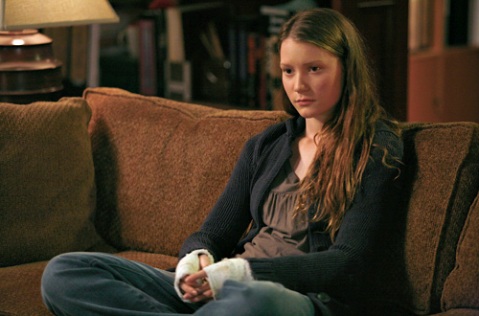
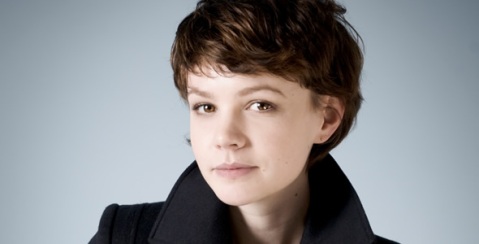
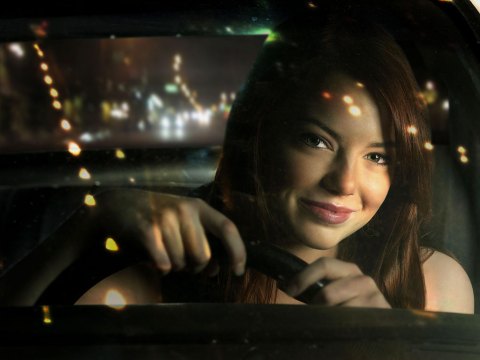
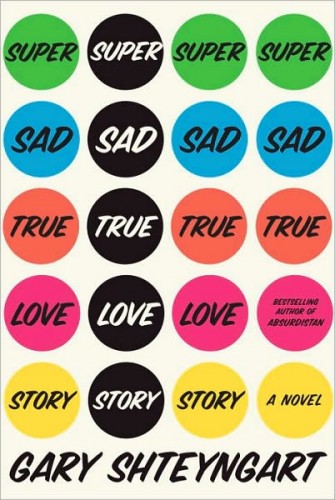
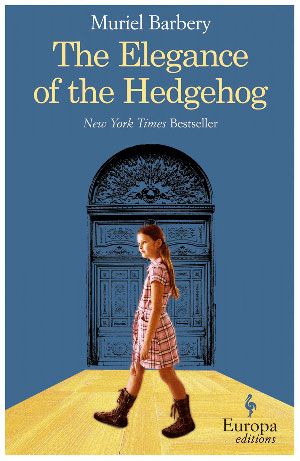 I’ve plunged myself into Muriel Barbery’s wonderful novel, The Elegance of the Hedgehog, which moves back and forth between the interior monologues of two brilliant women: the autodidact Renée, who hides behind her mask as an unkempt, sullen concierge in an elegant Paris apartment building; and Paloma, the precociously intelligent 12-year-old who lives upstairs and despises the pretentions of her family, teachers, and classmates. They seem to be on a path to discover one another — but I’m at the point in the novel when I’m so enjoying just listening to them think out loud that I’m not sure I care whether the narrative goes anywhere (Paloma has a diatribe about why grammar is about accessing the beauty of language that’s so wonderful I’m thinking of plagiarizing it for use in my classes).
I’ve plunged myself into Muriel Barbery’s wonderful novel, The Elegance of the Hedgehog, which moves back and forth between the interior monologues of two brilliant women: the autodidact Renée, who hides behind her mask as an unkempt, sullen concierge in an elegant Paris apartment building; and Paloma, the precociously intelligent 12-year-old who lives upstairs and despises the pretentions of her family, teachers, and classmates. They seem to be on a path to discover one another — but I’m at the point in the novel when I’m so enjoying just listening to them think out loud that I’m not sure I care whether the narrative goes anywhere (Paloma has a diatribe about why grammar is about accessing the beauty of language that’s so wonderful I’m thinking of plagiarizing it for use in my classes).







